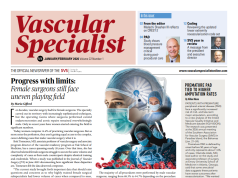
The Society for Vascular Surgery (SVS) is ramping up its national Highway to Health campaign to educate the public about peripheral arterial disease (PAD) and the importance of early detection as part of September’s PAD Awareness Month.
Anahita Dua, MD, a vascular surgeon at Massachusetts General Hospital and a spokesperson for the campaign, said the initiative is rooted in changing how people think about vascular health.
“PAD, if left untreated, can have complications similar to a heart attack or stroke,” said Dua. “It’s the same disease process—blocked arteries—but in the legs. And that means it’s just as serious.”
PAD affects millions of Americans, yet public awareness remains low. The Highway to Health campaign aims to close that gap through media outreach, educational resources and community events. The campaign’s website, YourVascularHealth.org, offers symptom checklists, videos, patient toolkits and guidance on finding vascular specialists.
“If you stop someone on the street and ask what a heart attack is, they know. Ask about PAD, and they have no idea,” said Dua. “That’s the problem. We talk to patients about amputation, but we don’t explain the disease itself.”
This lack of awareness leads to delayed diagnoses and missed opportunities for early intervention, according to Dua, who believes that community education is the key.“We need a national message where people understand PAD. If someone has crampy pain in their leg, they should think, ‘Maybe it’s PAD,’ and know to call their doctor.”
In August, the campaign generated 2.7 billion media impressions, more than 3,700 placements and 70 interviews, according to internal reports.
“You’re not going to be able to explain everything about PAD in one sitting,” Dua admitted. “But if people know what it is, they’ll know what to do next.”
Dua emphasizes that catching PAD early can dramatically change a patient’s outcome. “If you’re able to pick up that a person has PAD early, you can be aggressive about giving them the right medications and the right lifestyle modifications so that the PAD does not progress,” she said. “Because the end stage of PAD is an amputation.”
Dua talks of early detection allowing for interventions that can halt or even reverse the disease, referencing patients with intermittent claudication who commit to a structured walking program who can grow new blood vessels in their legs, reducing pain and improving mobility.
She encourages her patients to stay physically active, noting that regular movement can significantly improve circulation and reduce symptoms. “Movement is medicine,” said Dua. “Walking programs are incredibly effective in helping patients grow new blood vessels and regain mobility.”
Dua emphasized that awareness is the first step toward prevention. “No matter what surgical procedure we do, minimally invasive or open surgery, it won’t work if patients don’t make lifestyle changes,” she said. “So let’s start with awareness. Let’s make PAD something everyone knows about.”
For more information, visit vascular.org/Your-Vascular-Health.











